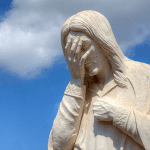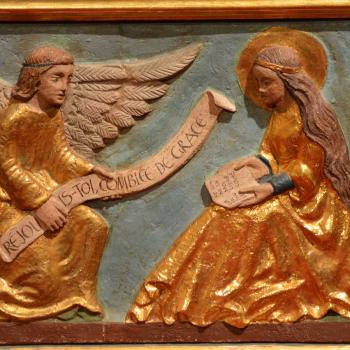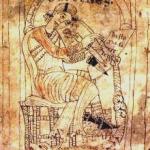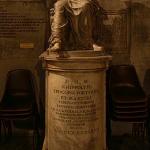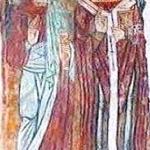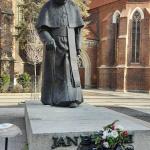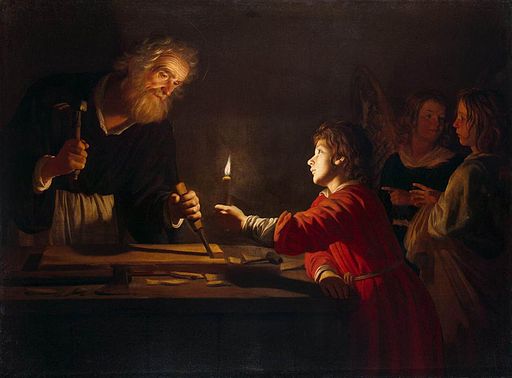
Today is the solemnity of Saint Joseph, which means that I have to come up with something to say about Saint Joseph. I’m notoriously at a loss when it comes to popular Latin Catholic saints, honestly. Most of them don’t strike my imagination very much, and all have been praised much more eloquently by better people than me.
But you know, I do love Saint Joseph.
I love him because he was a nobody like me.
Saint Joseph never said a word that was recorded in the Gospels. His wife was filled with the Holy Ghost and sang the first Magnificat, but as far as the Bible tells us, Saint Joseph never opened his trap. Sometimes I like to imagine he was literally mute, though I assume that’s not the case. Saint Joseph quietly resolved to divorce his young fiancee so as not to expose her to shame, then dreamed that an angel told him not to be afraid, then quietly took her into his home. This wordless determination to act justly no matter what life threw at him, in addition to quiet obedience to the occasional command from an angel– this was Saint Joseph’s prayer giving glory to the Lord. This was his Magnificat.
Saint Joseph was a working-class man, a carpenter– I’m told that profession was much more like a construction worker in those days. Don’t imagine a hipster artisan handcrafting authentic Shaker chairs; imagine a sweaty contractor in jeans and a hard hat putting together your house. That’s who Saint Joseph was. He was a manual laborer, a working-class man in a society that didn’t have a social safety net or any other place to fall into if a single thing went wrong. “Working class” meant “might starve to death by next month if I get sick or have bad luck” in those days. That was the knife edge he lived on, like most of the people in the history of the world. Most people are not exciting; they are not warriors or kings or high priests. They are ordinary human beings who live unglamorous lives on the edge of disaster, hoping they don’t fall prey to bad luck. The prayer of their lives is Saint Joseph’s silent Magnificat.
And, truth be told, Saint Joseph did seem to have remarkably bad luck. Imagine being a manual laborer living on the precipice of total ruin at all times, and being told you’ve got to drop everything and travel to Bethlehem to be registered for a census. Imagine having to cancel your obligations, lay down all your tools and saddle up the donkey. Now imagine your wife goes into labor while you’re in a city with absolutely no vacancies at the inn. And next thing you know, you’re on the run to escape a genocide. No time to think, no time to plan, no time to go back to Nazareth and pick up your carpentry things in the hopes you’ll find work wherever you’re going. Wake up your wife, pick up the baby and flee for the border.
He spent three years in hiding, a refugee, but he kept his wife and foster-Son alive.
He made his way back to Nazareth, that town out of which nothing good can come.
He brought his foster-Son to Jerusalem, and accidentally lost Him there, and searched for Him with great anxiety, but eventually that was sorted out as well.
Tradition says He died in the arms of Christ and Mary, as we all should hope to do.
That’s about all we know.
He didn’t found a monastery or write a treatise. He didn’t work any miracles we know of during his lifetime. Didn’t have children of his own, depending on what legends about him you believe. He did his job. He built houses. He took care of his family. He tried to live as justly as he could with whatever life threw at him, commonplace or otherwise. And on those rare occasions that the angel of the Lord appeared with a direct order, he quietly followed it. That’s all he ever did.
His great magnification of the Lord was doing his job and living his quiet, unlucky, painful, ordinary life as justly as he could.
Because of this silent Magnificat, he is the Patron of the Universal Church, the Light of Patriarchs. the Model of Artisans, the Terror of Demons, and Christ Himself was obedient to him.
May he intercede for all of us, now and at the hour of our death.
(image via Wikimedia Commons)



